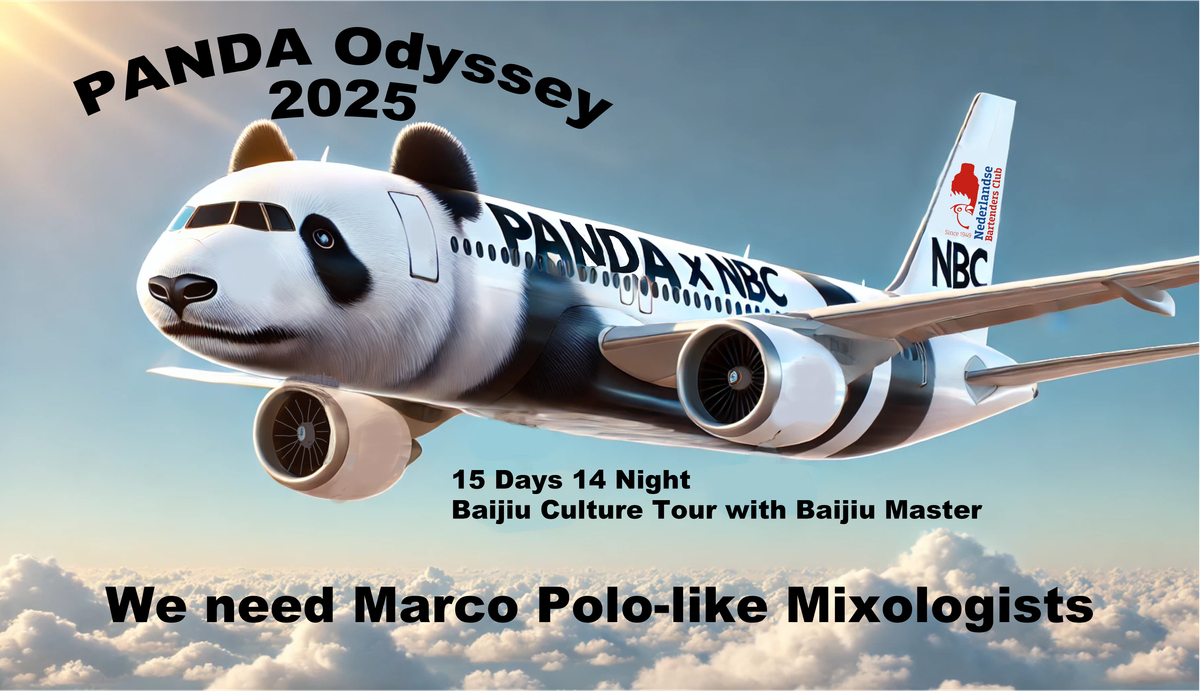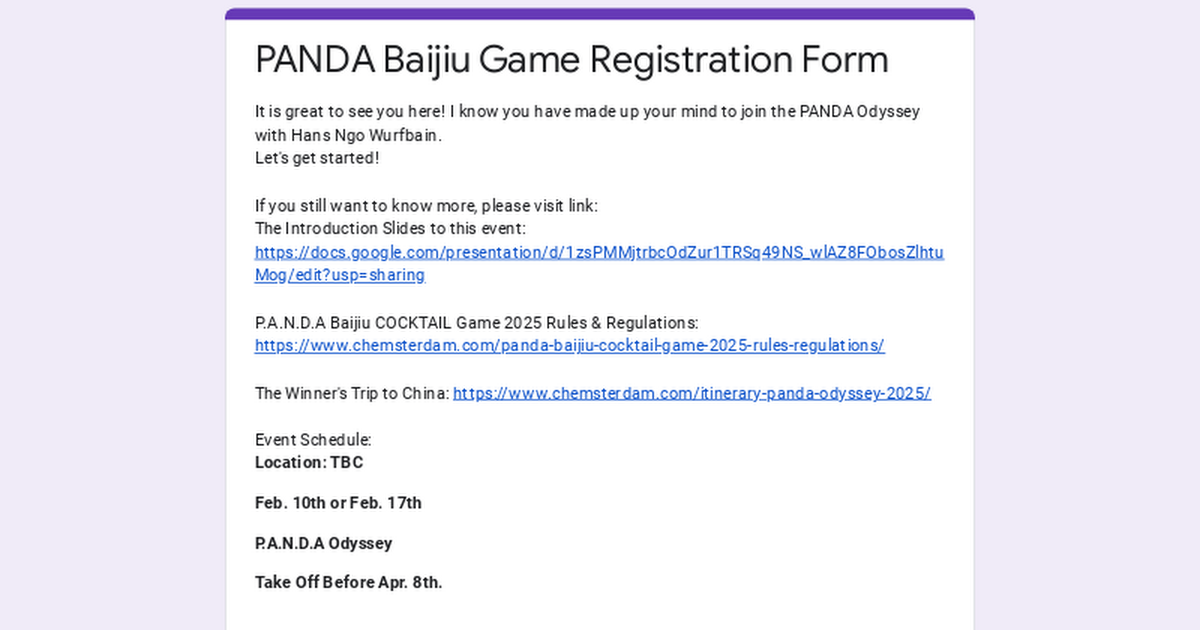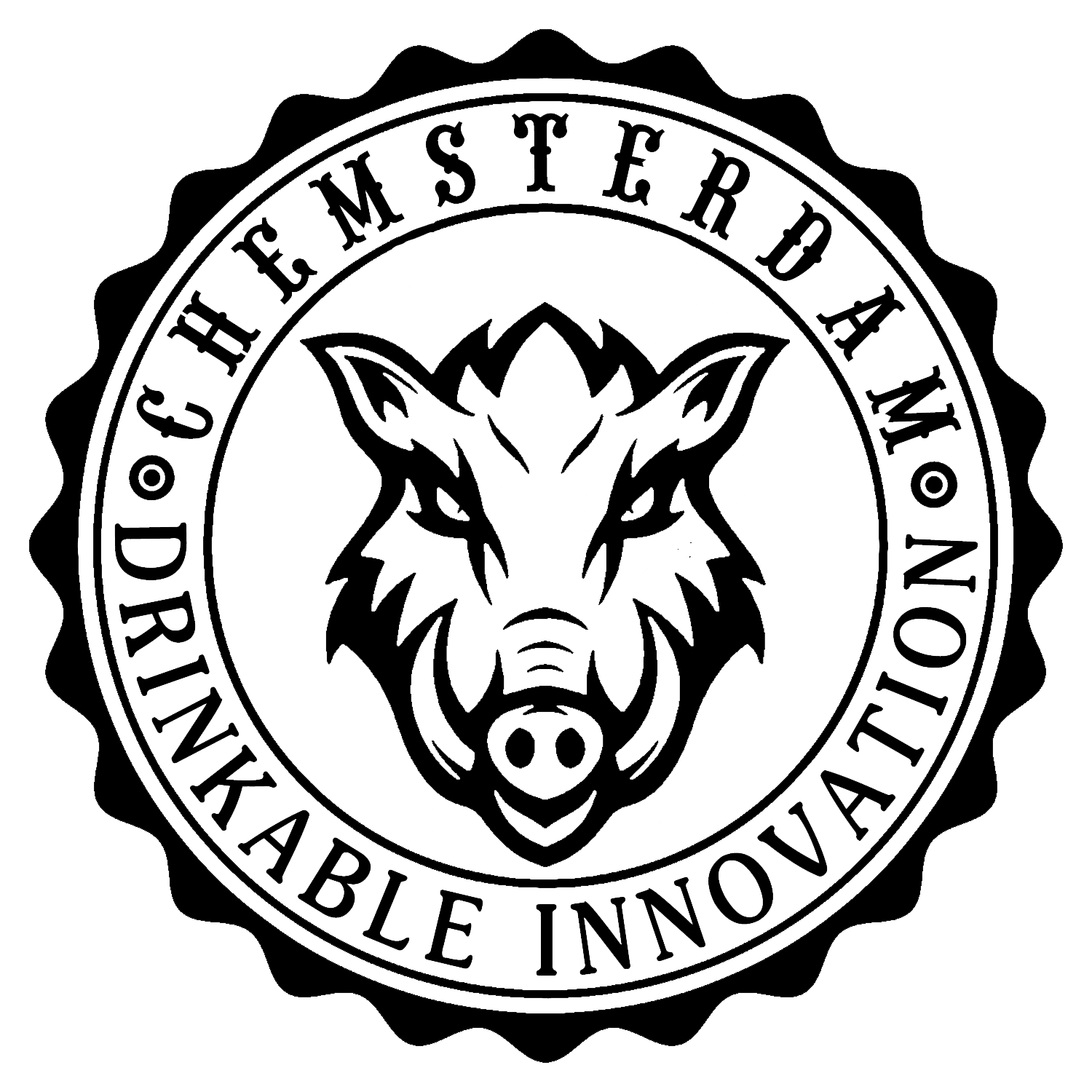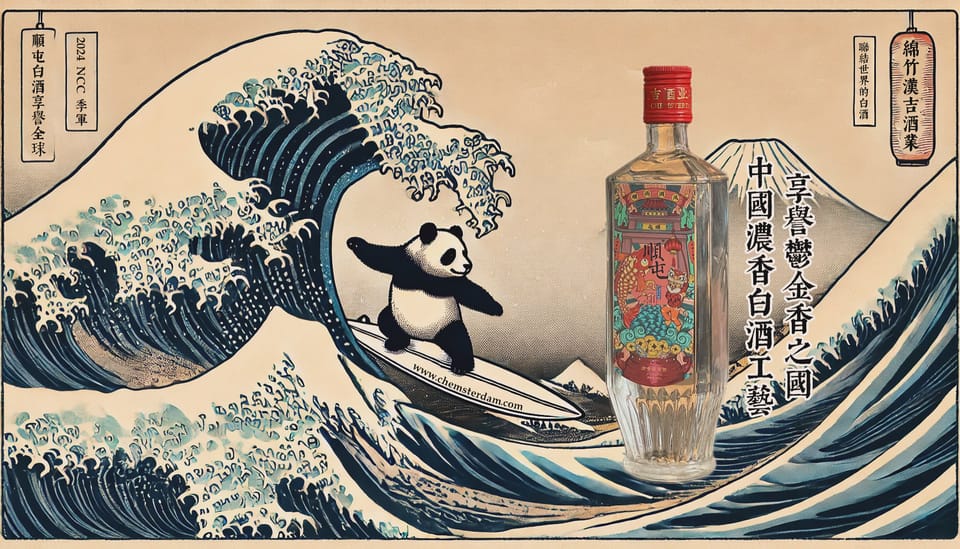Introduction


Disclaimer
PANDA is a BV registered in Utrecht and operated by a 172 cm tall, bald-headed, cycling Chinese sommelier and distiller. He readily admits his skills are limited in many respects, and he is committed to working and studying hard to fulfil his mission. He appreciates conversation, critique, and assistance in any form, always choosing to view challenges as encouragement to move forward. If you believe you can do better, feel free to organize your own event or offer your help—after all, we need more doers. Thank you, and may God be with you.
- 2nd homemade ingredient is allowed with a penalty, which -3 point.
- New version of the judge form has been updated with the 2nd home made ingredient.
Updated 6th, Feb, 2025
- FAQs Added in Ingredients Section, answering questions from registrants.
Updated Jan. 30th, 2025
- Registered: Mixxim(2+1, Zutphen), Stockroom(2+1, Groningen), Masa(1, Rotterdam), Freelance(Hoorn)
- Definition of Short Drinks and Long Drinks
Update: 8th, Jan. 2025
Deadline of Recipe Submission: Due to feedback from a few bartenders, the deadline of recipe submission has been rescheduled from Jan. 31st, 2025 to Feb. 14th, 2025. Good luck!
What defines a world-class spirit?
In 2024, if you type “How many kinds of spirits are there” into Google, the answer you usually get is: “Among the many distilled spirits available, there are just six base liquors: brandy, gin, rum, tequila, vodka, and whiskey.” (The 6 Types of Distilled Spirits Every Home Bartender Needs to Know About, author unknown). Of course, similar content is widespread, and even the most comprehensive resources often only go so far as to add “other” spirits beyond these six core categories.
As a master Baijiu sommelier and a preserver of traditional Baijiu craftsmanship, I’ve observed that this “other” category includes Chinese Baijiu. Baijiu, a spirit whose production is about three times that of global whiskey, is often not considered a major spirit in the world. More astonishing is the fact that Baijiu, a widely consumed spirit, lacks its own HS Code (Harmonized System Code) in European customs classifications. However, there are multiple reasons for this situation, and it’s not exclusive to Baijiu. Similarly, the national spirit of the Netherlands, Jenever, doesn’t have its own unique customs code in the Dutch or European system, often being classified as either “other types of distilled spirits” or even labeled as “Gin.” Aside from Baijiu and Jenever, many other regional or local spirits also lack recognition as major global spirits. This raises the question for P.A.N.D.A.: What defines a world-class spirit?
P.A.N.D.A. believes that most countries produce distilled spirits tied to their agricultural and natural resources. There are only about 200 countries worldwide, so if we categorize spirits based on country of origin, the total number of spirit varieties should not exceed 200. Factoring in similarities in raw materials and production methods, the actual number of distinct spirit categories would likely be much lower. The criteria for evaluating major global spirits should include:
1. Uniqueness of production techniques: Spirits that aren’t unique enough should be merged into existing categories, recognized as a regional variation or subcategory of a major spirit type.
2. Production and consumption volumes.
3. Recognition and awareness of the spirit category.
To preserve cultural diversity and protect regional heritage, P.A.N.D.A is committed to promoting lesser-known but distinctive spirits. Since the organization’s founder is from China and began by asking, “Why is Baijiu so unknown outside of China?” P.A.N.D.A will host its first cocktail game featuring Baijiu as the main theme and invites members of the Dutch Bartenders Club (NBC) to participate in this inaugural event.
In the future, we will feature different spirits or combinations of spirits as the central theme for P.A.N.D.A. Cocktail Games.
Today, we cordially invite you to join us in exploring the world of spirits and their unique flavors.
Thanks to Many People and Organizations
Special Thanks to Ludvig and the Nederlandse Bartenders Club
P.A.N.D.A’s growth in Europe owes much to Ludvig Saaf of Sweden and the Nederlandse Bartenders Club. Special thanks go to Swedish Baijiu trader Ludvig Saaf, who not only introduced our Baijiu, SHUNTUN, to the Swedish market, but also helped us understand the safety standards for spirits production in the world’s most strictly regulated countries, along with various indicators and requirements related to environmental sustainability and human rights as outlined by the United Nations’ SDG17. This has provided SHUNTUN with a compliance roadmap as it expands beyond China to the international stage.
Additionally, we are deeply grateful for the support from the Nederlandse Bartenders Club, which has fostered positive connections between SHUNTUN Baijiu and many talented bartenders in the Netherlands. Importantly, the National Cocktail Competition organized by the NBC provided SHUNTUN Baijiu with an opportunity to showcase itself, ultimately winning the Bronze Medal in the NCC 2024 under the skilled hands of Laurynas Lazdauskas.
I also wish to thank Timo Janse, the Vice Chairman of the NBC, for explaining the organizational processes and rules of cocktail competitions to me.
Of course, SHUNTUN’s ability to face various challenges in the Netherlands, standing firm in the face of adversity, is the result not only of the aforementioned key individuals but also of the many open-minded, flavor-passionate friends who have supported us along the way.
New Friends, Let’s Celebrate Together!
When I first started preparing to sell Baijiu in the Netherlands, none of my friends believed in my idea. They thought exporting Chinese Baijiu abroad was impossible. Their reasoning was: people have already tried, and they were richer and spent more on marketing than I could, but they didn’t succeed. Therefore, I wouldn’t succeed either. But I told them: when Marco Polo came to China, he had no idea how interconnected the world would become in the future. Nor did he know how isolated cultures would eventually become so mutually dependent. If Marco Polo cared about achieving globalization within his lifetime, he would never have set out from Venice. Similarly, if my goal were to see Baijiu exported globally within my lifetime, I wouldn’t have set out from Chengdu.
I heard Jesus tell me: The Nederland, your promised land.
Since March of this year, I have cycled over 6,300 kilometers across the Netherlands, visiting 110 slijterij, liquor stores in Dutch, and now have partnerships with 36 of them. Although sales figures are not as optimistic as I’d hoped, I’m glad to see so many people interested in Baijiu, and even some Dutch locals who enjoy its unique flavor.
Thanks to the warmth of Dutch friends, I’d like to invite you, within my limited means, to join us at our Baijiu Cocktail Game. The winner will have the opportunity to travel to China and see how Baijiu is produced. Due to the current scale, we will focus on exploring the production of 浓香型 (Strong Aroma) Baijiu, which dominates China’s market share.
In addition, we will host Bar Takeovers in several major cities and visit significant historical landmarks in China. Oh, and since you’ll be traveling with Hans, the hottest Chinese guy in Utrecht, your trip will certainly include unforgettable culinary experiences. Hans is also an apprentice of Wang Zhilong, a disciple of Cheng Shengde, a master of Sichuan cuisine at the Sichuan Old Chefs’ Culinary Research Association.
Let’s harmonize Eastern and Western cultures through the medium of Baijiu cocktails and create amazing drinks together!
After consulting with the Dutch Bartenders Club and industry supporters, the first P.A.N.D.A Cocktail Game (Baijiu-themed) will ask participants to create two Baijiu cocktail recipes: one traditional cocktail and one long drink, with SHUNTUN Baijiu as the required base spirit for both.
The finals will be held in one of four cities: Amsterdam, The Hague, Rotterdam, or Utrecht, to maximize convenience for all participants.
Given that we will be following NBC’s competition rules, P.A.N.D.A encourages all Randstad-area bartenders who wish to participate to be NBC members. Bartenders outside Randstad are welcome to participate without NBC membership, though we warmly invite non-members to join the NBC either before or after registering for the event.
- The P.A.N.D.A. Cocktail Game (Baijiu) is open to all NBC guild members within the Randstad region; outside Randstad, it is open to any bartender currently working in a bar.
- Competition rules may be updated and changed as the P.A.N.D.A. Committee continuously identifies trends and opportunities.
- Baijiu Cocktail Competition (PANDA CG) recipes must be submitted to the PANDA CG Committee by the closing date of Feb. 14th, 23:59. Each participant must submit two PANDA CG entry forms (cocktail and long drink), including recipes, methods, and a brief paragraph about the inspiration for the drink. PANDA CG entry forms must be submitted as PDF files and include a portrait photo of the participant (close-up, full-color, high resolution of at least 1MB, preferably higher).
- Before the competition, all recipes will be reviewed for eligibility.
- All submitted recipes will remain the property of PANDA CG and its sponsors.
- PANDA will not be responsible for the unavailability of beverages, garnishes, or bar equipment during the competition.
- A detailed list of PANDA CG sponsor ingredients will be provided, and participants are encouraged to use these wherever possible.
- Recipes submitted after the closing date will not be accepted.
- Participants are responsible for ensuring their recipes comply with the guidelines and rules.
- Entries must be submitted using the official PANDA CG entry form in PDF format.
- No changes to recipes will be allowed after submission unless approved by the PANDA CG Committee.
- Recipes must be the original creation of the participants. If plagiarism is suspected, competitors may be disqualified.
Ingredients
You will need to created 2 drinks:
- Short Drink: 70-90 ml
- Long Drink: 120-350 ml
- The bottles syrups are limited to full product line of Lucas Bols and as well as what you can find on the shelf of Wynand Fockink.
- You can use only one home-made ingredient in each drink, and if you use one, you have to share the recipe with instruction to reproduce it.
- There is NO limit of SODA, and be aware that Wonderful Spirit is supplying all different flavors of Fever-Tree Soda.
- Be creative.
- Both Cocktails & Longdrinks must not contain more than six (6) ingredients, including bar spoons, drops or dashes and solid ingredients such as fruit or spices.
- Recipes must contain at least 1,5 cl of the sponsor product, except for cocktail bitters, foamer and cocktail elixers. Here, a few drops (or dashes) may be sufficient.
- Recipes must contain at least 4 cl of alcoholic ingredients.
- Recipes may not contain more than 7 cl of alcohol in any cocktail.
- Recipes must contain no more than four (4) alcoholic ingredients.
- Recipes must contain at least SHUNTUN Baijiu. The other ingredients must be a modifier (i.e. bitters, cocktail syrups -Mathieu Teisseire-, liqueurs, etc). A second (2nd) base spirit (brandy, rum, whiskey, vodka, etc) may also be used, but must be less than the assigned Sponsor Member brand if also a base spirit.
- All garnishes inside the glass which are touching the liquid are considered ingredients. Spray of citrus zest over the drink, the use of a vaporizer (vapor or spray) will be considered an ingredient. Points will be deducted by the Tasting Judge if decoration falls from the side of the glass.
- All ingredients in the recipe must to be selected from the Sponsors as supplied. This list of products can change from year to year depending on the composition of the PANDA Sponsors. As an example: All liquors are supplied by Bols and Wynand Fockink in the 1st Edition of PANDA Baijiu Cocktail Game.
- Homemade Ingredients: Each drinks contains no more than 2 homemade ingredient and the instruction of making the ingredient has to be submitted to the organiser. 1st homemade ingredient with its instruction of making it is allowed without penalty; the 2nd home ingredient with its instruction of making it is allowed with penalty.
- Strictly no: heated ingredient(s).
- Strictly no: non-sponsored ingredients. Except if it’s an ingredient there is no sponsor for.
- Strictly no: artificial ingredients or colorants.
- Strictly no: open flame.
- Strictly no: Homemade ice cubes, House of Bols will supply
- Dairy products will consist of cream, eggs, ice cream, milk, yoghurt and patisserie products.
- Any quantities of fruit, herbs and vegetables used (or similar) must be stipulated; exact measures must be always stated.
Decoration and Garnish
- Garnishes are used inside the glass, both for decoration as well as for modifying purposes.
- Garnishes are considered a modifier (cocktail cherry, fruit zest, olive, etc.) and are counted as an ingredient if they are placed in the cocktail rather than on the rim of the glass.
- Decorations are used on the rim, side, on the stem or on the top of the glass only and are not considered an ingredient.
- Ingredients placed on the rim of the glass, such as sugar and salt, are meant to be part of the flavor of the drink so even though they are on the rim, they are considered an ingredient.
- Decorations and garnishes must be edible. The use of edible flowers, fruits, herbs, leaves, spices and vegetables, including barks, fruit shells, peels, pips (seeds) from fruits, sprigs and stems, etc. are allowed. Flowers used in the drink or as decoration must be of an edible variety.
- Garnishes may be mounted on cocktail picks, forks, skewers, sticks, straws or other common bar accessories.
- Decorations and garnishes must be prepared (cut-up) in the back-stage area at the NCC garnish table during the garnish time (15 minutes), prior to going on stage. Any kind of pre -fixed garnishes made beforehand (partly prepared elsewhere) will be removed from the competition and may risk being eliminated from the competition by the NCC committee.
- Garnishes may only be placed on glasses once the competition has begun. Placing the garnish on the glassware prior to preparing the cocktail is not accepted.
- No ice may be put into glasses prior to start of the competition.
- The competitor brings his own types of fruits, vegetables or herbs.
- The competitor must arrange all ingredients at his/her own expense.
- Food dyes will not be allowed.
- Manufactured products (such as cocktail picks, etc.) may be used to fix the garnish to the glass but will not be used to enhance the visual appeal of the garnish.
- Condiments such as: salt, sugar, pepper, cinnamon and nutmeg (as well as other similar spices), chocolate decoration (only when prepared in the back-office) and other condiments that are internationally used, will be allowed.
- The use of so-called “side-garnish” or “staged cocktails” (cocktails served on small plates, saucers, trays with additional garnishes on display next to the cocktail glass) is not permitted.
- Airs, foams and specifications are allowed. All ingredients used to make airs/foams must be made in the presence of a judge and abide by the maximum 6 ingredient rule. All ingredients and techniques must be explained in detail on the recipe submission document.
- Any questionable decorations and garnishes must be approved by the NCC Committee.
Glassware
- The competitor will/should bring their own glassware enough for 2 cocktails and 2 long drinks so 4 glasses minimum. If the competitor is planning to make more or use more, then should bring more.
- The classic glassware will be supplied by House of Bols, if you need special containers, you can bring your own, which should not have any logo of competing brand of Bols.
Competitor preparation
- The order of competitors will be drawn at the start of the day.
- Competitors will dress in the attire of the bar they are representing.
- The House of Bols will supply ice; cubes and crushed.
- The use of measures is NOT mandatory for competitors. Free pouring is allowed.
- Competitors may choose from the following methods for preparing cocktails: build (directly in glass), stir (mixing glass), shake (strain or double strain) or blend (electric).
- You must bring your own bar tools. The competitor is responsible for any additional tools necessary.
Competitors sequence of the competition
- Competitors must supply the required garnishes and their own utensils on stage.
- Competitor will prepare four (4) cocktails and four (4) longdrinks according to the recipes.
- Competitors are given all most all flavors of Lucas Bols products per cocktail and per longdrink to create their recipes with.
- In the event of unexpected accidents during the preparation of the cocktails (through no fault of the competitor), or any kind of misfortune takes place while transporting the cocktails to the Tasting Jury, the NK Committee - in consultation with the competitor - will seek and propose a satisfactory solution for all parties involved.
- Competitors will remain on stage until they are signaled to leave.
Time and penalties
- The time allowed for the preparation of decorations and garnishes is fifteen (15) minutes.
- Competitor exceeding the preparation time of fifteen (15) minutes will be penalized by ten (10) points.
- If a change is enacted by a competitor in any way, in the recipe or garnish, or he/she does not follow his/her original recipe in any way, both in compilation and/or presentation, a penalty of ten (10) points will be deducted, applied to the tasting points only and based on a judgment made.
- Competitor will be given two (2) minutes to set-up for the competition. During these two (2) minutes, the technical judging will already be effective. Competitors may use the two (2) minutes preparation time only to get acquainted with the workstation and initiate activities such as polishing glassware, checking bar materials or bottles and to double check things like ice, etc.
- Competitors may not use the two (2) minutes preparation time to fill glasses with ice, work on decorations and/or garnishes in, on, or around glasses, and may not pour any ingredient into glasses and/or bar materials.
- If a competitor fails to make all his/hers two (2) cocktails and two longdrinks for instance only two (2) cocktails are taken to the jury, this competitor will only receive the scores from two (2) judges. Furthermore, such a contestant faces a ten (10) point penalty for not delivering the cocktail for the show table.
- Competitors will be limited to five (5) minutes for mixing their cocktail & longdrink. A competitor who exceeds the time limit will be penalized by the Technical Jury. The addition of 1 minute (an sixth minute) will be added to competition time for the qualifying round to allow competitors to share inspirations/stories.
- The time frame may affect the actual result of the drink. A special Judge, being part of the Technical Jury is appointed and will be responsible for the time monitoring of the contestants.
- The Technical Jury is appointed and will be responsible for the time monitoring of the contestants.
- The Technical Jury will make judgments for time penalties collectively. The penalty time for competitors exceeding their performance time of five (5) minutes is:
· -15 points for exceeding time from 1 to 15 seconds
· -30 points for exceeding time from 16 to 30 seconds
· -60 points for exceeding time from 31 to 60 seconds
· -75 points for exceeding time by 61 seconds or more
- As the time frame forms part of the actual results, it is compulsory to appoint a special judge responsible for monitoring the time only.
Awards & Prices
- The top participants in this event will be awarded free access to join the P.A.N.D.A Odyssey 2025 based on the total number of registrations, while other participants will also enjoy subsidized travel eligibility. For example, if the number of registrations falls between 40 and 49, both the first and second places will receive a free 15-day trip with P.A.N.D.A for PANDA Odyssey 2025, and the third place will need to pay €800. The fees corresponding to each ranking are outlined below according to the number of registrations.
- The itinerary has been published: Click for the Itinerary.
|
Number of Registrants |
≤19 |
20-29 |
30-39 |
40-49 |
50-60 |
|
1st |
0 |
0 |
0 |
0 |
0 |
|
2nd |
2000 |
1200 |
800 |
0 |
0 |
|
3rd |
2500 |
2000 |
1200 |
800 |
0 |
|
4th |
2800 |
2500 |
2000 |
1200 |
800 |
|
5th |
3000 |
2800 |
2500 |
2000 |
1200 |
|
6th |
3000 |
3000 |
2800 |
2500 |
2000 |
|
7th |
3000 |
3000 |
3000 |
2800 |
2500 |
|
8th |
3000 |
3000 |
3000 |
3000 |
2800 |
|
9th |
3000 |
3000 |
3000 |
3000 |
3000 |
Reference:
The 6 Types of Distilled Spirits Every Home Bartender Needs to Know About. (不详). The Spruce Eats. 取读于 2024年10月21日, 从 https://www.thespruceeats.com/quick-guide-to-distilled-spirits-760713



